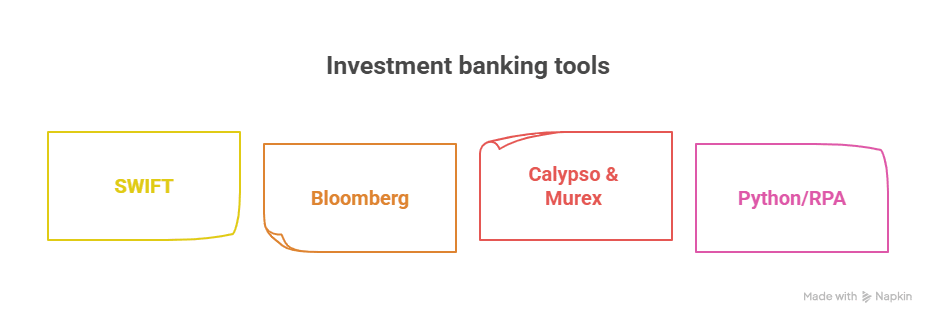Imagine the fast-paced world of billion-dollar deals, mergers, IPOs & global trading desks. Behind the scenes of this high-stakes arena lies a complex system that ensures every transaction is accurate, compliant, & timely. Welcome to the world of Investment Banking Operations… the heartbeat of the financial engine that powers global markets.
If you’re intrigued by the mechanics that keep investment banks running like well-oiled machines or considering a career behind the trading floor glamour, this guide will demystify the core of investment banking operations and show you how everything works together.
What Are Investment Banking Operations?
Investment Banking Operations refers to the set of processes & systems that support and manage the execution, clearing, settlement, & risk management of financial transactions. In simpler terms, while traders and bankers negotiate big deals on the front lines, operations ensure everything behind the curtain runs flawlessly.
These professionals don’t just process paperwork – they ensure regulatory compliance, manage large volumes of data, monitor risk, and optimise workflows. Without them, a single failed transaction could ripple across global markets.
🎥 Watch this video to get a quick visual breakdown of Investment Banking Operations:
What is Investment Banking Operations?
Investment Banking Basics: What You Should Know
Before we dig deeper, let’s go over some investment banking basics:
| Term | Meaning |
| Investment Bank | A financial institution that helps individuals, corporations, and governments raise capital and offer advisory services. |
| Front Office | Involves client-facing roles like sales, trading, and M&A advisory. |
| Middle Office | Focuses on risk management, compliance, and financial control. |
| Back Office in Investment Banking | Includes operations, settlements, technology, and administrative support. |
Understanding these components is essential for decoding how investment banks work.
The Investment Banking Process – Step by Step
Here’s how a typical transaction flows through the investment banking process:
| Stage | Description |
| Deal Initiation | Front office negotiates the deal (e.g., buying stocks or issuing bonds). |
| Trade Execution | Orders are placed and executed in the market. |
| Trade Capture | The trade details are recorded into the system. |
| Trade Matching | Both parties agree on trade terms (buyer and seller reconciliation). |
| Settlement | The actual exchange of securities and funds. |
| Post-Settlement | Compliance checks, reporting, and risk management are done. |
This structured approach is at the core of the investment banking workflow. Every stage is closely monitored by the operations team to ensure nothing goes wrong.
Front Office vs Back Office Banking – What’s the Difference?
Understanding the divide between- front office vs back office banking is crucial when exploring careers in finance.
| Front Office | Back Office |
| Revenue-generating roles | Support functions that facilitate transactions |
| Includes sales, trading, M&A | Includes settlements, tech support, documentation |
| Client-facing | Internal processes |
| High pressure, fast-paced | Detail-oriented, risk-sensitive |
While the front office closes the deal, the back office in investment banking ensures it’s completed safely, legally, & correctly.
How Investment Banks Work – The Inside Scoop
So, how investment banks work on a broader scale?
They perform three primary functions:
- Advisory Services – Helping clients with mergers, acquisitions, and restructuring.
- Trading and Brokerage – Buying/selling securities on behalf of clients or the bank itself.
- Capital Raising – Helping companies raise funds through IPOs, bonds, etc.
However, all these glamorous activities require a robust investment banking workflow, governed by compliance, risk, and operational efficiency.
Operations professionals are the hidden gears making this machinery run. Want to dive deeper into how roles vary? Check out this insightful article:
👉 High‑Paying Investment Banking Job Roles
Building a Career in Investment Banking Operations
For those who prefer precision over pitching, and processes over persuasion, there are several careers in investment banking operations worth exploring.
| Role | Key Responsibilities |
| Trade Support Analyst | Ensures trades are booked correctly and settled on time. |
| Risk & Control Officer | Monitors risk exposure and compliance breaches. |
| Settlements Analyst | Confirms and settles securities and cash transactions. |
| Documentation Specialist | Manages contracts, agreements, and legal paperwork. |
| KYC/AML Analyst | Conducts background checks and ensures anti-money laundering compliance. |
Most of these roles begin in the back office in investment banking but offer clear growth paths into middle-office risk management or supervisory roles.
To get started on this path, consider professional certification. The Certified Investment Banking Operations Program by Imarticus is a top choice for beginners and graduates.
The Rise of Technology in Banking Operations
Automation, AI, & data analytics are reshaping investment banking operations. Today, operations teams rely on tools like:
- SWIFT for global payments
- Bloomberg for trade confirmation
- Calypso & Murex for derivatives
- Python/RPA for automation workflows
This tech-driven shift is not just about speed—it’s about reducing risk and improving accuracy.

Investment Banking Workflow in Real-Time
Let’s walk through a real-world investment banking workflow for a trade:
📈 Scenario: A trader at an investment bank buys 10,000 shares of Tesla
| Department | Action Taken |
| Front Office | Executes trade using a trading platform like Bloomberg. |
| Middle Office | Checks whether the trade complies with risk limits and regulations. |
| Back Office | Reconciles the trade details, initiates settlement, sends confirmation. |
Without precise coordination, even a simple trade can go awry. That’s why strong investment banking process knowledge is crucial.
Challenges in Investment Banking Operations
Despite advances, there are challenges:
- High volume and time-sensitive transactions
- Regulatory scrutiny and constant audits
- Legacy systems vs new tech integration
- Human errors leading to financial losses
Addressing these issues is where skill, training, and attention to detail come into play. That’s why learning the ropes through an industry-focused program like Imarticus Learning’s CIBOP can be a career game-changer.
Front Office vs Back Office Banking – Why Both Matter
There’s often a misconception that the back office in investment banking is less important. That couldn’t be further from the truth.
While front-office deals bring in revenue, operational efficiency determines profitability. Any error in clearing or settlement can lead to regulatory fines, client dissatisfaction, or worse—loss of reputation.
The two are not opposites, but complementary. Understanding front office vs back office banking is key to appreciating the complete picture of how investment banks work.
🎥 For a deeper dive into real banking operations, check this explainer:
Investment Banking Operations Roles Video
The Future of Operations in Banking
The future of investment banking operations is evolving fast. Automation will handle more manual tasks, while professionals will be expected to manage exceptions, analytics, and regulatory strategy.
Want to explore what lies ahead? Don’t miss this must-read:
👉 Future of Investment Banking – Key Predictions & Insights
Moreover, skills in business management, strategic thinking, and tech-savviness will play a critical role. See how management skills can boost your operational career here:
👉 How Business Management Skills Help in Investment Banking
Ready to Launch Your Career?
If you’re excited about problem-solving, detail orientation, and want to be at the heart of financial markets without selling or trading, then careers in investment banking operations are for you.
Why Choose Imarticus CIBOP?
| Feature | Benefit |
| Industry-Endorsed Curriculum | Learn real-world investment banking basics and workflows. |
| 7+ Guaranteed Interviews | Direct access to top hiring firms. |
| 3–6 Months Duration | Quick entry into the workforce. |
| 85% Placement Rate | High chances of success with structured career support. |
👉 Explore the Certified Investment Banking Operations Program
Frequently Asked Questions
1. Is investment banking operations a good career for beginners?
Absolutely! If you’re just starting out and want to enter the world of finance without diving straight into high-pressure sales or trading, investment banking operations is a great place to begin. It gives you a solid understanding of how the financial world really works behind the scenes.
2. Do I need to be a finance graduate to get into this field?
While a finance or commerce background definitely helps, it’s not mandatory. What matters more is your understanding of financial systems, attention to detail, and willingness to learn. Many people come in from different academic streams and do well with the right training.
3. What’s the work environment like in operations?
It’s usually fast-paced but structured. You’ll work closely with traders, compliance teams, & technology professionals to ensure everything runs smoothly. Deadlines are important… but it’s not as aggressive as front-office roles.
4. Can I move from operations to other departments like risk or compliance?
Yes, definitely! Many professionals start in operations and then move to middle-office functions like risk management, compliance, or- even tech-based roles. It’s a great stepping stone for broader roles in finance.
5. Do investment banking operations involve coding or programming?
Not always, but it’s becoming increasingly useful. Tools like Excel, Python, or basic automation knowledge can really boost your profile. That said, you can still do well without coding if you’re strong in process management and analysis.
6. Is it necessary to work long hours in operations?
It depends on the firm and your specific role. Some roles might require extended hours during peak times (like financial quarter-ends), but in general, operations roles offer better work-life balance than front-office roles.
7. What skills are most important for success in investment banking operations?
Great question! You’ll need strong attention to detail, good communication, problem-solving ability, & a basic understanding of financial products. Being organised and comfortable with data also goes a long way.
Final Thoughts
Investment Banking Operations may be less flashy than trading, but it’s no less exciting. You’re the force that ensures the engine of global finance runs without a hitch.
Whether you’re a student, a recent graduate, or a curious learner, this field opens up avenues into risk, compliance, settlements, & technology-driven roles that are always in demand.
Understanding how investment banks work; the roles within the investment banking process, & the difference between front office vs back office banking is just the beginning.
If you’re ready to deep-dive, the opportunities are endless.




 The journey begins with upskilling oneself to suit the requirements of an investment banking operations career.
The journey begins with upskilling oneself to suit the requirements of an investment banking operations career.
 If you’re looking forward to jumping start your
If you’re looking forward to jumping start your 
 The investment banking sector also stepped in to explore the world of automation and how they can utilize it.
The investment banking sector also stepped in to explore the world of automation and how they can utilize it.
